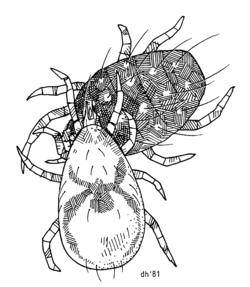Difference between revisions of "Typhlodromus pyri (predator)"
From Pestinfo-Wiki
| Line 1: | Line 1: | ||
{{TaxLinks|LnkTyphlodromus}} | {{TaxLinks|LnkTyphlodromus}} | ||
{{LiteratureDB1|{{PAGENAME}}|browse,hostsP}} | {{LiteratureDB1|{{PAGENAME}}|browse,hostsP}} | ||
| + | [[File:ACAR Phytoseiidae Typhlodromus pyri+european red mite.png|250px|thumb|''Typhlodromus pyri'' feeding on ''Panonychus ulmi'' (click on image to enlarge it)<br/>Author(s): Des Helmore<br/>Source: [https://commons.wikimedia.org/wiki/File:ACAR_Phytoseiidae_Typhlodromus_pyri%2Beuropean_red_mite.png Wikimedia Commons]]] | ||
<font color="#008000">'''''Typhlodromus pyri'' (predator)'''</font> Scheuten | <font color="#008000">'''''Typhlodromus pyri'' (predator)'''</font> Scheuten | ||
| − | + | This predatory mite is found in Europe, surrounding regions, North America, as well as some other parts of the world like Australia and New Zealand. It is a predator of spider mites and is commercially produced in Europe, where it is mainly used on fruit trees, grapevine and hop. Common target pests are the European red mite (''[[Panonychus ulmi]]'') and the two-spotted spider mite (''[[Tetranychus urticae]]''). | |
[[Category:Typhlodromus (genus - predators)]] | [[Category:Typhlodromus (genus - predators)]] | ||
Revision as of 10:58, 20 August 2021
| Literature database |
|---|
| 161 articles sorted by: |
| • year (recent ones first) |
| • research topics |
| • countries/regions |
| • list of pest species |

Typhlodromus pyri feeding on Panonychus ulmi (click on image to enlarge it)
Author(s): Des Helmore
Source: Wikimedia Commons
Author(s): Des Helmore
Source: Wikimedia Commons
Typhlodromus pyri (predator) Scheuten
This predatory mite is found in Europe, surrounding regions, North America, as well as some other parts of the world like Australia and New Zealand. It is a predator of spider mites and is commercially produced in Europe, where it is mainly used on fruit trees, grapevine and hop. Common target pests are the European red mite (Panonychus ulmi) and the two-spotted spider mite (Tetranychus urticae).